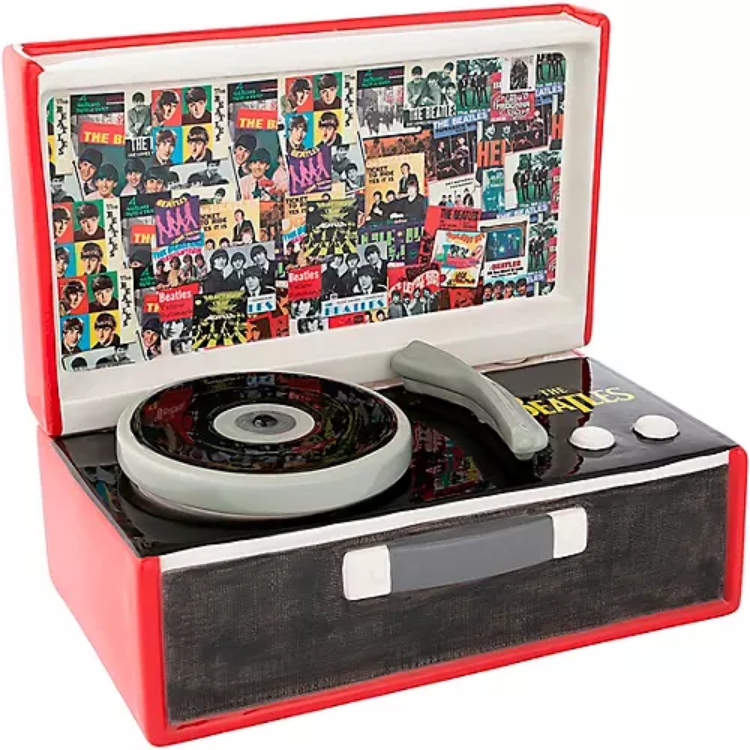- Register
- Log in to Tune-In
- Wishlist (0)
-
Shopping cart
(0)
You have no items in your shopping cart.

Paul McCartney opens up about mending fences with John Lennon before the star's 1980 death. McCartney says making up with Lennon is "one of the great blessings in my life". He talks about their bond in the new documentary Paul McCartney: Man on the Run.
Paul McCartney is forever grateful that he and John Lennon gave peace a chance. The legendary musician and his late bandmate had a bond so tight they were like brothers — but after the Beatles’ breakup in 1970, their friendship frayed.
In the new documentary Paul McCartney: Man on the Run, McCartney says he’s glad that he and Lennon were able to set aside their differences before the “Imagine” singer’s tragic murder on Dec. 8, 1980. “One of the great blessings in my life is that we made up. It’s beautiful and it’s sad at the same time,” says McCartney, 83. “You know, we loved each other all our lives.”
McCartney and Lennon first met as Liverpool lads, and went on to find international fame and success as members of the Beatles alongside George Harrison and Ringo Starr. But their relationship soured as the band broke up in 1970, and things culminated in a lawsuit McCartn details

John Lennon, Paul McCartney, George Harrison, and Ringo Starr of the Beatles started out in Liverpool, England, but it wasn’t long before the band took the entire world by storm. As the group ascended to superstardom, the famed foursome expanded their horizons and put down roots around the UK and beyond.
The group’s 1964 song “I’ll Follow the Sun” is “a ‘Leaving of Liverpool’ song,” McCartney explained in his 2021 book The Lyrics. “I’m leaving this rainy northern town for someplace where more is happening.” Once they did leave, the band's rise to fame was stratospheric. Of course, it wasn’t all massive crowds and wild concerts; the four led quieter lives in their time at home, where they penned and practiced some of their greatest hits. To provide a peek behind the curtain into their private worlds, we’ve rounded up some domestic snapshots of the iconic musicians below.
Harrison spent the first six years of his life at 12 Arnold Grove in Wavertree, Liverpool, before the family moved into a council house (a form of British public housing) at 25 Upton Green in Speke. The three-bedroom home, as seen in this 1955 photograph of Harris details

Hollywood stars including Paul Mescal have been spotted filming what is believed to be the new series of The Beatles biopics.
Cameras were seen outside the former home of John Lennon, on Menlove Avenue, in Woolton, Liverpool, as the street was taken back in time for the series.
Crews are expected to remain in Woolton for the duration of the week, where screens had been erected to block passers by getting a peak at what was being filmed. More commonly known as Mendips, John lived at the address with his aunt Mimi until 1963.The series of films, which are currently in production, are slated to be released in 2028 and will star Paul Mescal as Sir Paul McCartney, Barry Keoghan as Sir Ringo Starr, Harris Dickinson as John Lennon and Joseph Quinn as George Harrison.Paul Mescal could be seen as Sir Paul McCartney on set, with Leanne Best playing Aunt Mimi as she hung out the window of Mendips.
A road sign states City Road will also be closed until 1am on 28 February.
A notice has also been distributed to residents of several streets in Dingle informing them that filming for the new Fab Four series will take place there too.
Source: ITV News
details
Nowadays, no one can deny that George Harrison is one of the best songwriters of his generation. But it wasn't always like that. While Harrison was always a talented musician, it took him a while to get comfortable enough in his writing abilities to actually bring his songs to The Beatles. He was the youngest in the band, not by much, but the Fab Four had met when they were teenagers, and two years could be a big difference at those ages.
In The Beatles: Get Back, they can be seen joking about Harrison being "the baby" of the band, and this put him at a disadvantage when it came to getting his songs included in Beatles albums. His first solo album is the clearest example of that. A lot of the songs included, many of which turned out to be huge hits, were songs that the band had previously rejected. Here's how George Harrison became one of the greatest songwriters in history. George Harrison Wasn't Initially a Songwriter.
In The Beatles Anthology, he opened up about how difficult it was for him to assert himself as a songwriter, and that Paul McCartney and John Lennon had written all of their "bad songs" long before the band had a record contract, so they were already experts by the time they had to r details

There’s something so interesting about learning what food celebrities enjoy after a long day filming a movie, performing a concert for thousands on stage, or on the road and away from home. And it seems like a lot of them can’t get enough of sandwiches. Julia Roberts loves a peanut butter and jelly sandwich with sour cream and onion chips, George Clooney’s favorite is a ham, lettuce, tomato, and mustard toasted on potato bread, and Kate Winslet loves a classic grilled cheese.
Everyone has their go-to, but the lead guitarist for The Beatles, George Harrison, loved a sandwich so much that it's forever memorialized in a studio recording.
George Harrison's Favorite Sandwich
The Beatles have many iconic albums, but one of the most celebrated is "The Beatles," aka the White Album. And on one studio recording, Harrison can be heard placing a lunch request before counting into the legendary song, "While My Guitar Gently Weeps."
He asks for a cheese, lettuce, and Marmite sandwich, as well as a cup of coffee. If this sounds appealing to you, it's pretty easy to make. All you need is your choice of cheese, two slices of bread, lettuce, and Marmite, a thick, dark brown food spread tha details

1969 was a year full of change for Paul McCartney. In January, he recorded the Let It Be album and movie with The Beatles, and did his last live performance with them. In March of that year, he married his first wife, Linda Eastman, and adopted her daughter, Heather. Months later, the couple had their first child together, Mary McCartney. By all means, McCartney lived in domestic bliss. And then, his world turned upside down when John Lennon announced he was leaving The Beatles.
In his new documentary, Man on the Run, McCartney opened up about how hard the breakup hit him. It pulled him into a depression and left him doubting if he could ever write music again. He'd only ever written songs with Lennon and had been in The Beatles since he was 15. But thankfully, he wasn't alone in going through that. He had his wife, Linda, by his side, and she was the one to pull him out of the darkness. In return, McCartney wrote her one of the most beautiful love songs in history.
When John Lennon told his bandmates that he was leaving The Beatles, McCartney felt his entire world collapse. At Linda McCartney's suggestion, he moved his new family to a run-down farm he owned in Scotland to run away from the chaos of London details

The Jim Irsay Collection forms a chorus of cultural touchstones and chronicles one of the greatest collections of music, film and sports memorabilia and historic Americana ever assembled. Meticulously compiled over decades by the late philanthropist, passionate music lover and owner and CEO of the Indianapolis Colts, a portion of the proceeds of these sales will be donated to philanthropic causes supported by Jim Irsay during his lifetime.
This unparalleled collection weaves together some of the most significant people, literature and events of recent history: guitars and other instruments once played by all four Beatles, Eric Clapton, Bob Dylan, David Gilmour, Jerry Garcia, Kurt Cobain, Elton John, Prince, Johnny Cash, Janis Joplin, John Coltrane and Miles Davis; original manuscripts by Jack Kerouac, Jim Morrison and Steve Jobs; legendary sporting artefacts linked to Muhammad Ali, Jackie Robinson, Wayne Gretzky and Secretariat.
From March 2026, the collection will be offered across four major auctions, giving collectors the rarest of opportunities to become the next custodians of objects that have inspired generations and continue to shine as beacons of our shared creative legacy.
Location
Christie
details

Barry Keoghan has brought his work home as he rocked a Ringo Starr-style ensemble at London's Burberry show after a day filming a new Beatles biopic. The actor, 33, transforms into legendary drummer Ringo Starr for the upcoming Beatles biopic.
He will star in the flick alongside Paul Mescal as Paul McCartney, Harris Dickinson as John Lennon and Joseph Quinn as George Harrison.
And after a day filming in the capital city, he arrived channelling Ringo with a mariner cap, for the Burberry Autumn/Winter 2026 collection catwalk show. For the outing, he wore a purple and black plaid Burberry coat, which he paired with black trousers.
He completed his ensemble with black leather gloves, which featured an emerald chain, and a pair of black boots. Barry Keoghan, 33, has brought his work home as he rocked a Ringo Starr-style ensemble at London's Burberry show after a day filming a new Beatles biopic
For his Beatles role, Barry has been spotted growing out a beard and styled his hair in Ringo’s classic shaggy cut.
The Daily Mail revealed that the Beatles biopics will be filmed at London's iconic Abbey Road Studios, with production getting underway in November last year des details

The Beatles have produced hundreds of songs throughout their career as a band, along with an impressive catalog of solo work from each member, and there is no denying how most of their songs have shaped popular music, often being considered timeless classics. But with a number of songs recorded, there will always be a few that feel a bit subpar, a bit rushed, and sometimes slightly out of place on an artist’s otherwise legendary discography. Even a band as monumental as The Beatles had tracks they later considered “filler.” Not every song was regarded as a masterpiece by the band itself, especially by Paul McCartney in particular.
"Hold Me Tight" Was The Beatles' Attempt at Crafting Another Hit Single
By the time the band recorded their second studio album, With the Beatles, they had already established a name for themselves as a musical act to look out for. The album itself contains some of their early standout tracks, including songs like "All My Loving" and "Please Mr. Postman." It was also met with widespread critical praise and strong commercial success, with critics calling it an impressive follow-up album, especially complimenting the album’s more polished production and more mature s details
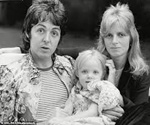
Paul McCartney's daughter Stella McCartney recalled how 'hurt' her late mother was by the bullying she faced from fans.
Linda McCartney was a founding member of her husband's band Wings, which launched in 1971, just a year after he announced he was leaving The Beatles.
McCartney's wife, a photographer by trade, did not always win over critics as she played keyboard and sang harmony in Wings.
In the new documentary Paul McCartney: Man on the Run, her daughter Stella, 54, discussed the impact the criticism had on her mother, who died of cancer in 1998 at age 56.
'She wasn't a cookie-cutter example of someone you put in a band. What they, and she especially, had to go through, like when they isolated her voice and ridiculed her? I mean, it breaks my heart,' the designer said in the documentary.
'I know that there was pain there. I knew she hurt. She wasn't like, cold,' Stella added.
Paul McCartney's, 83, daughter Stella McCartney, 54, recalled how 'hurt' her late mother Linda McCartney was by the bullying she faced from fans and critics; Stella pictured in 2025
Linda, who died of cancer in 1998 at age 56, was a founding member of her husband's band Wings, which launched in 19 details
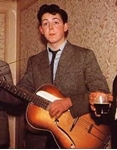
An unassuming Liverpool street went back in time on Monday as director Sam Mendes prepared to shoot scenes for his new anthology of Beatles films outside the childhood home of Sir Paul McCartney.
Mendes is currently working on an ambitious collection of films about the pioneering pop group and their emergence from Liverpool's subterranean Cavern Club to become the biggest and most influential band in the world.
Having already filmed raucous scenes in central London, the director and his team have relocated to Allerton and the modest street outside 20 Forthlin Road, McCartney's home for several years before signing his first record deal with The Beatles in 1962.
Built in 1949, the address was originally bought by McCartney's father Jim in 1955. He would remain their for a decade, until his son – by now a global star – bought him a new house in Heswell, a more prosperous part of the Wirral.
The terraced home, now a National Trust property, was a hive of activity as the street was cut off by traffic cones and diversions were created for oncoming vehicles.
With black tents and vintage cars lining either side of the road, production assistants were seen wheeling period-appropriate details
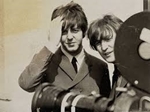
John Lennon delivered some of the most celebrated songs in music history, both during his time with The Beatles and throughout his solo career. Among his most enduring solo works are "Happy Xmas (War Is Over)," "Woman," "Jealous Guy," "(Just Like) Starting Over," "Give Peace a Chance," "Grow Old with Me," "Nobody Told Me," "Watching the Wheels," and arguably his most universally beloved composition, "Imagine." Yet among the many songs Lennon wrote, one held a particularly special place in the heart of Paul McCartney. That song is “Beautiful Boy (Darling Boy),” a deeply personal track from Double Fantasy, his fifth collaborative studio album with Yoko Ono.
John Lennon Wrote "Beautiful Boy (Darling Boy)" as a Tribute to His Son Sean
“I haven’t chosen any Beatles records, but if we had more than eight, I probably would have. I haven’t chosen any of my records so to sum up the whole thing I have chosen one of John Lennon’s from Double Fantasy, which I think is a beautiful song very moving to me. So, I’d like to sum up the whole thing by playing ‘Beautiful Boy.’”
The song reflects Lennon’s desire to protect his child from the world’s uncerta details

The Beatles sang a lot of songs about love and delivered many songs with the word “you” in the title in their early days. But as the 60s progressed, they started to branch out with their lyrics to keep in line with the psychedelic times.
These four songs defy easy description if you just focus on the narrative. But they nonetheless show off the ambition and ingenuity of The Beatles’ songwriters.
“I Am The Walrus”
John Lennon was starting to get fed up with people analyzing his song lyrics looking for deeper meanings between the lines. He decided to purposely send them way off out into the woods with a song that was mostly nonsensical. And yet, what brilliant nonsense “I Am The Walrus” turned out to be. Lennon raised the stakes on Dylanesque stream-of-consciousness writing, adding his love of Lewis Carroll’s wordplay and absurdist humor to a thesaurus-straining choice of words. Throw in a little bit of hippie-ish sentiment: “I am he as you are he as you are me/And we are all together.” Stir it all up and you end up with a surreal masterpiece where the wildness of the music is more than matched by the daring of the words.
“G
details

While Anna Sawai has been busy conquering TV and film, the Emmy-winning “Shōgun” star first got her start in show business as a member of the J-pop band FAKY. Now, Sawai is going back to her musical roots in the role of Yoko Ono in Sam Mendes’ forthcoming “Beatles” biopics.
“It was my dream to tell her story and I didn’t think it would come this quick,” Sawai told Variety at the Los Angeles premiere of Apple TV’s “Monarch: Legacy of Monsters” Season 2 on Thursday night. “There’s a version of her I feel people still don’t understand. And in this film, I think we’re going to be able to tell that side of the story.”
To prepare, Sawai has been busy reading everything she can about the artist and musician. “So much reading, oh my gosh,” she said. “So many books, so many videos, so many articles…She has so much artwork that also shows her personality.”
While on set in London, Sawai teases it’s been fun to hear the cast — Paul Mescal as Paul McCartney, Harris Dickinson as John Lennon, Joseph Quinn as George Harrison and Barry Keoghan as Ringo Starr — play the iconic ba details

It's 1969. The Beatles are trying to record what would become their final albums, and they're at each other's throats. Nothing is working. Then a visitor enters the studio, the keyboard player Billy Preston. On a whim, he sits down to join them for a song, and the mood totally changes.
LENNON: You've given us a lift, Bill. We've been doing this for days.
MARTIN: Did you catch what they said? You're in the group. You've given us a lift. We've been doing this for days. Preston saved those sessions, which is just one reason John Lennon called him the fifth Beatle. But Preston died in 2006. Younger generations barely know who he is. There's a new documentary that hopes to change that. It's called "Billy Preston: That's The Way God Planned It." I spoke with director Paris Barclay.
PARIS BARCLAY: I didn't know about his relationship to Beatles. I didn't know that he played with the Rolling Stones constantly. And as I started to do a little research, I discovered that not only was he a transcendent performer musically, but that his story, including even the tragic things that happened, can be sort of a cautionary tale for how we deal with genius and especially how the Black church deals with people who are diff details

They were awards given to The Beatles at the peak of their fame - but have been out of sight for 60 years.
Now the gongs, including one for their 1966 smash hit Paperback Writer – a number one in both the UK and US charts – are to go under the hammer this coming week. The commemorative discs are described as 'real rarities' and experts predict they'll be a hit with collectors - each selling for over £10,000.
The 7-inch silver disc for Paperback Writer was presented to the band by a weekly music paper in 1966 after the single's huge success.
The catalogue description released by Surrey-based Ewbanks Auctioneers, states: 'The Beatles received this award for the hit single 'Paperback Writer' released on the Parlophone label 10th June 1966, from the (then) prominent British weekly music paper 'Disc' (later Disc and Music Echo)'. Ewbanks said the award came 'at a pivotal point in the band's career, marking the end of live shows and touring and becoming a more experimental studio based creative powerhouse, a time when Brian Epstein's influence was fading, Beatle Boots, suits and head shaking were all in the past'. However, it was 'a time that many consider the peak of th details
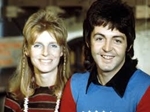
Paul McCartney’s new documentary revisits life after the Beatles and the formation of Wings. McCartney described seeing footage of Linda as “very emotional” and deeply personal. Lost home videos resurfaced, adding a special family touch to the film.
At the screening of his latest film, which explores his life after the Beatles and the formation of Wings, McCartney reflected with Us Weekly, “I think all the stuff with the kids and Linda is lovely to see. I mean, obviously, the Linda stuff was very emotional. She looks so beautiful. She’s so cool.”
He continued, “Me and Linda interacting is very special, because she’s not here. Seeing the kids little, ’cause they know they’re not little anymore … they’ve got kids of their own. Linda, the kids, me and John [Lennon], just these memories … it’s like a life flashing in front of me.”
According to the outlet, several of the photos and home videos featured in the documentary were taken by Linda, adding a special and deeply personal touch to the film. McCartney later admitted he had long believed the footage was gone for good and was stunned when it resurfaced. details

It sounds counterintuitive to suggest that The Beatles, the most celebrated band of all time, has forgotten songs, and even more so to suggest the group has forgotten No. 1 hits. In fact, interest in the Fab Four has remained incredibly high in the decades since the band broke up back in 1970. But as the years have passed, the popularity of individual songs within The Beatles' discography has fluctuated. If we look at the numbers of streaming platforms such as Spotify, we can see at the time of writing that some of the band's iconic singles, such as "Hey Jude" and "Let It Be" — both of which hit the top spot on the Billboard Hot 100 — continue to attract a huge listenership. Yet many of the most popular Beatles songs were not singles at all but album tracks that have aged particularly well, such as "Here Comes the Sun" and "In My Life."
With that in mind, we're revisiting five of the 20 Beatles singles that topped the charts in the United States but whose popularity has waned slightly within the band's discography. Don't get us wrong: These songs still have tens of millions of plays on streaming platforms (it's The Beatles, after all). But the truth is they no longer have a seat at the top table in terms of details

“It was John’s original inspiration, I think my melody, I think my guitar riff. That’s my recollection”: Lennon might have written the lyrics, but as McCartney remembers it, he “wrote the tune” to one of The Beatles’ greatest and most poignant songs.
Anyone looking to pinpoint the moment when The Beatles turned from pop idols into mature artists will inevitably hone in on their landmark sixth studio album Rubber Soul. Recorded over a four-week period, from 12 October to 11 November 1965, Rubber Soul is The Beatles’ first masterpiece, a hugely influential pre-psychedelia work that draws on folk, soul and pop.
Sonically the album signalled a major shift, as the band incorporated soul-style bass lines, fuzz bass effects, harmonium and sitar. But it also marked a transition in John Lennon and Paul McCartney’s songwriting, from pop singles to a more cohesive, mature, album-orientated style.
Much of this was due to the ongoing influence of Bob Dylan, the folk-rock jangle of The Byrds and soul artists on the Motown and Stax labels whose music The Beatles soaked up from radio stations across the US during the summer of 1965.
Then, of course, ther details

Paul McCartney had a famously stoic reaction to John Lennon's death in 1980. Lennon's son Sean Ono Lennon defends McCartney in the new documentary Man on the Run. McCartney's daughter Stella also reveals he did, in fact, have an emotional reaction to Lennon's death.
Just hours after John Lennon’s death, Paul McCartney was bombarded by reporters asking him for a reaction to losing his lifelong friend and bandmate.
The stunned McCartney, 83, famously offered a stoic response, nonchalantly telling the reporters, “[It’s a] drag, isn’t it?” in a clip that has been repeatedly analyzed by fans. Now, in a new documentary following McCartney’s life and career, Lennon’s son Sean Ono Lennon is opening up about why the singer’s reaction actually makes a lot of sense to him.
“I always notice the look in his eyes and the tone of his voice. Really felt like someone who was unable to process what was going on,” Sean says in the documentary Man on the Run (in theaters Thursday, Feb. 19 and Sunday, Feb. 22 only and out on Prime Video Feb. 27). “He just seemed almost robotic, which I think some people took possibly as coldness, but I never t details

Though John Lennon reached the highest levels of musicsuccess with The Beatles, the prolific singer-songwriter only topped the Billboard Hot 100 chart once while he was alive. Lennon’s 1974 song, “Whatever Gets You Thru The Night,” was put together with an assist from another major player in the music game, Elton John, and was inspired by an unexpected television show.
The song made its debut on September 28, 1974 and made it to the top of the chart by November. American Songwriter reports that the song’s title and message came from Lennon’s late-night channel surfing habit.
May Pang, who was his wife Yoko Ono’s personal assistant and who was in a romantic relationship with Lennon (approved by Ono!) at the time he wrote the song, told Radio Times, “One time, he was watching Reverend Ike, a famous Black evangelist, who was saying, ‘Let me tell you guys, it doesn’t matter, it’s whatever gets you through the night.’ John loved it and said, ‘I’ve got to write it down or I’ll forget it.’”
The song eventually made its way onto Lennon’s 1974 album, Walls and Bridges, with a little help from Elton John. Whi details

Paul McCartney met the actor set to portray him in an upcoming four-film project about the Beatles.
McCartney, 83, and Paul Mescal, 30, were amongst the attendees at the London screening of Oscar-winning filmmaker Morgan Neville’s Man on the Run. The Amazon MGM documentary details McCartney’s life after the Beatles disbanded. Mescal attended the premiere with girlfriend Gracie Abrams. The pair posed with McCartney on the red carpet. A photo illustration of The Beatles for the Obsessed podcast.
Mescal will be seen as McCartney in the forthcoming movie series The Beatles — A Four-Film Cinematic Event. The set of four films, each focusing on a Beatles member, will release theatrically in April 2028. In addition to Mescal, the films feature Harris Dickinson as John Lennon, Joseph Quinn as George Harrison, and Barry Keoghan as Ringo Starr.
Each segment of the film anthology will be directed by Oscar-winning director Sam Mendes, known for critically acclaimed projects like American Beauty and Skyfall. Mendes also produced Hamnet, in which Mescal starred as William Shakespeare.
Other key characters will be played by a starry cast: Saoirse Ronan as Linda McCa details

Billy Preston recorded several albums for the Beatles’ Apple Records and added a driving organ to the song “Get Back” (1969), which was credited to “the Beatles with Billy Preston,” the only time the group shared credit with another artist. He also contributed to the albums Abbey Road (1969) and Let It Be (1970), and he was part of the band’s legendary rooftop concert during the making of the documentary film Let It Be (1970).
Source: britannica.com
details
Nearly 60 years after the most devastating breakup in music history, Oscar-winning documentarian Morgan Neville is shedding new light on what kept the Beatles from reuniting.
“Every single interview any of them gave in that entire decade, they were asked, ‘When are the Beatles going to get back together?’” Neville, 58, told Obsessed: The Podcast host Matt Wilstein in a new interview about his latest documentary, Man on the Run. “They could not escape it.”
Despite the band’s refusal to answer those questions at the time, Neville now believes they had something in the works.
“I actually think, if John had lived, they would’ve gotten back together,” the director added. “Eventually, somehow, somewhere.”
Portrait of the The Beatles. From left to right: Ringo Starr, Paul McCartney, John Lennon, and George Harrison, circa 1965.
The Beatles' split in 1970 rocked the music world to its core and left each of the band's members questioning their musical futures. McCartney later reflected that he thought he might "never write another note of music ever."
Neville has spent his 30-year career piecing together the live details

Documentary filmmaker Morgan Neville dove in deep to create “Man on the Run,” a movie about Paul McCartney in the 1970s after the Beatles’ breakup. The film, which is playing at selected theaters locally, arrives on Prime Video on February 27th.
By the time he’d completed the film, the director had far more interview material than he could fit into two hours. McCartney’s company, MPL, decided to use that material as the basis for an oral history book, “Wings: The Story of a Band on the Run.”
Ted Widmer, a historian and former speechwriter in the Clinton White House, was leaving a McCartney concert in 2023 when he ran into a book editor he knew, Bob Weil, and they discussed their love of the Beatles.
Later, Widmer positively reviewed McCartney’s photo book, “1964: Eye of the Storm,” and it turned out that Weil had been the editor of that book and other recent McCartney publications. Widmer learned all this in early 2024 when Weil called and invited him to compile the oral history into a book. “I was excited,” Widmer said in a recent video interview. “We had to work really fast. We had a good team with Bob and a couple details




